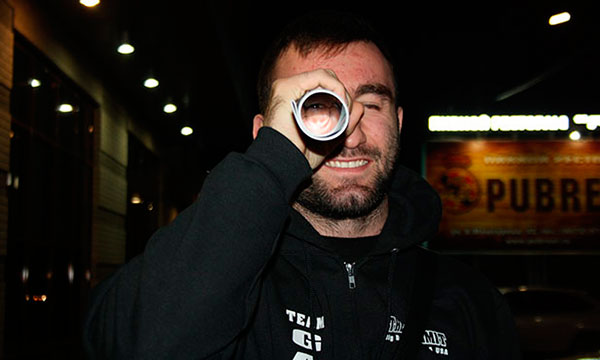Shutting of Georgian-Russian border prevents ordinary people from visiting loved ones across the mountains.
By Elizaveta Valieva in Balta and Vladikavkaz
Larisa Pavliashvili has lived in a small house in the village of Balta in Russia’s autonomous republic of North Ossetia for five years, after moving back here with her two younger daughters from the Kazbegi region of Georgia, on the other side of the nearby mountains.
Larisa, 46, has a tough life, supporting her grandmother and two older daughters who stayed behind in Kazbegi. Visiting them, at least, used to be easy enough – a mere 90-minute bus ride — and Larisa used to bring food for them when she went to see them.
Now these relatives belong almost to a different world on the other side of a sealed border.
For the past year-and-a-half, the Russian-Georgian border through North Ossetia has been closed and Larisa and many others have been separated from their loved ones.
She recently checked out of hospital where she underwent an operation for a hernia, brought on by stress and overwork.
“When the road was open, I was a trader, I took goods from Tbilisi and Vladikavkaz and back,” she said. “After they closed the road I worked in the bakery at the Elektrotsink factory. The work was hard and I earned myself a hernia.”
North Ossetia and Georgia are connected by the 208-km-long Georgian Military Highway which was built in tsarist times and traverses the Caucasus range across one of the highest mountain passes in Europe. The two crossing points are Verkhny Lars on the Russian side and Kazbegi on the Georgian side.
The Russian authorities closed the Verkhny Lars crossing point in June 2006. The closure hit inhabitants of border areas on either side of the crossing they hardest; previously they had the right to travel across without a visa by having a special slip in their passport.
The Kazbegi region is much closer to the North Ossetian capital Vladikavkaz than to Tbilisi, which is on the other side of a high mountain pass. There have always been lively trading links between villages on either side of the border.
Almost all the inhabitants of North Ossetian border villages have terrible stories to tell about the costs of closing Verkhny Lars.
“One old man from [the village of] Kobi went on business to Kazbegi region and died there; his heart stopped,” she said. “At that moment, they closed the road. The relatives could not go and collect his body. He was buried by strangers.”
People on both sides of the border have asked the authorities in North Ossetia several times to intercede on their behalf to have the frontier reopened.
The press office of the border department of the FSB counter-intelligence service told IWPR that this was a matter for the federal authorities in Moscow, not those in North Ossetia.
Taimuraz Mamsurov, the president of North Ossetia, said that an ever-growing number of people were appealing to him to be allowed to cross into Kazbegi region. He said that he had asked for help from a series of top officials in Moscow and been given the answer that the border crossing point was being rebuilt.
According to the North Ossetian customs service, the crossing point is being refurbished to increase its capacity so that it can handle 400 vehicles a day.
Balta is in North Ossetia but has a predominantly Georgian population. Many families send their children to the Georgian-language school in Vladikavkaz, although there is a local school. There is very little work in the village and young people mainly earn their living on construction sites in the big city.
“It’s hard to get to work in Vladikavkaz,” said Nodar Tinikashvili, who lives in Balta. “There’s only one bus service which works only on weekdays because it carries students and workers.”
The border villages do not have natural gas and there is no water in Lars. According to the deputy head of the local region, Marina Chkareuli, “We asked for help but we were told there was no money. They promised but it wasn’t clear when it would come.
“The biggest problem for these villages is the border closure because most of the people here have connections with Kazbegi region. Many families are divided, with the children on one side and parents on the other. It’s upsetting when a son can’t go to his mother’s funeral. It’s very hard for people.”
Zaur Kuchiev, North Ossetia’s economics minister, told IWPR that the economy of the autonomous republic as a whole had not suffered from the border closure, only the border regions.
“It has a small effect but there is no shortage of fruit,” he said. “In the main, imports come from Moscow and from Stavropol region.”
Armenian political analyst David Petrosian said that the closure of Verkhny Lars was a purely political issue.
“The main reason for is thatwithin the context of its confrontation with Georgia, the Russian leadership is trying to restrict Georgian farmers’ ability to get their goods to market,” said Petrosian.
However, if the intention had been to foster discontent amongst Georgian farmers against their own government, the policy seems to have failed. Georgia has found other markets for its goods in the rest of the South Caucasus and the Black Sea region.
The biggest loser from the border closure has been Armenia, which used Verkhny Lars as its main overland trading route with Russia and which is now having to seek alternative markets.
Zaur Abashvili of the Georgian justice ministry in Tbilisi said that the closure hurt the inhabitants of Kazbegi region more than most.
“The closure of this road is a huge economic blow for the people of Kazbegi,” he said. “For two centuries this region, has been much closer economically to Vladikavkaz than to Tbilisi. We know of course that this road was the main and almost the only means of communication between Georgia and Russia, and also between Armenia and Russia.”
Zurab Gagua lives on the Georgian side of the border, in the village of Arsh.
“It’s a great pity that it’s impossible to meet relatives and friends in Lars, Vladikavkaz or Beslan,” he said. “The closure of this road is a big threat to relations between two close peoples of one [Orthodox Christian] faith, the Ossetians and Georgians.”
Divided families cannot even afford to keep in touch by telephone. “It’s cheaper to call America than to call Georgia,” said Larisa Pavliashvili. “A minute’s conversation costs 24 roubles [about one US dollar]. So on the whole we keep in touch by SMS.
“If the road opens tomorrow, I will take half a sack of flour to Kazbegi, that will be a real help for my children. I will take them sunflower oil and sugar, which are far more expensive there. Flour costs 1,000 roubles a sack in Kazbegi and a [monthly] pension is 500 roubles. And with a pension like that, do you pay for gas or buy flour? It’s much harder than here.”
She concluded, “It’s become much harder for poor people since the road closed. For me personally, it’s a catastrophe.”
Elizaveta Valieva is editor of the www.ossetia.ru website in Vladikavkaz


NO COMMENTS